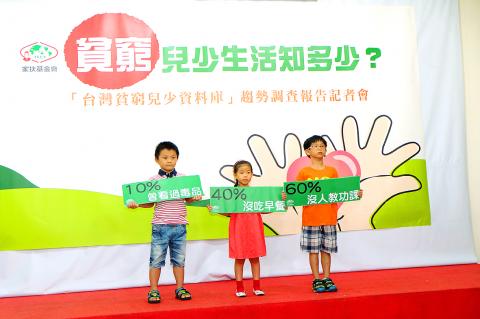The Taiwan Fund for Children and Families yesterday voiced its concern over the increasing number of children from economically disadvantaged families who are exposed to illegal drugs, citing a survey that tracked more than 4,000 children from these families over a five-year period.
“In 2009, we picked 4,000 from the 50,000 children that the foundation helps take care of and tracked them for five years,” foundation executive director Betty Ho (何素秋) told a news conference in Taipei yesterday.
“Over the years, we have noticed many issues that need more public attention. However, there is one issue that is particularly worrying, and that is nearly 10 percent of respondents in the focus group said they have seen illegal drugs either through friends or in nightclubs,” Ho said.

Photo: Chen Ping-hung, Taipei Times
“Ten percent of 4,000 children, that is 400 [children]. It is a huge number,” Ho added.
Foundation research and development director Wei Chi-li (魏季李) agreed, adding that the problem was worsening.
“According to our figures, as many as 6.9 percent of the children surveyed said they had seen illegal drugs [in 2009], and the number jumped to 9.6 percent this time,” Wei said. “If they have seen illegal drugs, some of them may have actually done drugs, so it is a really a cause for concern.”
Aside from the drug issue, a large percentage of children from disadvantaged families face more challenges in life.
“These children face three major problems: the first is food, second is education and third is coping with daily life,” Ho said.
She added that this year’s survey showed that more than 40 percent of respondents said they skip breakfast, more than 60 percent said they do not regularly have three meals a day and 30 percent said they intentionally skip meals to help their families save money.
“As for education, most of the families cannot afford to send their children to tutorial classes. More than 70 percent of the parents also said they do not have time to help their children with their homework because they are busy working to make a living,” Ho said.
To help the government and academics better understand the problems that children from disadvantaged families face, Ho said the group has created a database on children of disadvantaged families.
“We welcome researchers to contact us to use the information, so that they may come up with better policies to help the children combat these challenges,” Ho said.

A strong continental cold air mass is to bring pollutants to Taiwan from tomorrow, the Ministry of Environment said today, as it issued an “orange” air quality alert for most of the country. All of Taiwan except for Hualien and Taitung counties is to be under an “orange” air quality alert tomorrow, indicating air quality that is unhealthy for sensitive groups. In China, areas from Shandong to Shanghai have been enveloped in haze since Saturday, the ministry said in a news release. Yesterday, hourly concentrations of PM2.5 in these areas ranged from 65 to 160 micrograms per cubic meter (mg/m³), and pollutants were

Taiwan’s armed forces have established response protocols for a wide range of sudden contingencies, including the “Wan Chun Plan” to protect the head of state, the Ministry of Defense (MND) said today. After US President Donald Trump on Saturday launched a series of airstrikes in Venezuela and kidnapped Venezuelan President Nicolas Maduro, concerns have been raised as to whether China would launch a similar “decapitation strike” on Taiwan. The armed forces regularly coordinate with relevant agencies and practice drills to ensure preparedness for a wide range of scenarios, Vice Minister of National Defense Hsu Szu-chien (徐斯儉) told reporters before a

EVA Airways on Saturday said that it had suspended a pilot and opened an investigation after he allegedly lost his temper and punched the first officer several times as their plane was taxiing before takeoff at Los Angeles International Airport. According to a report published on Thursday by The Reporter, the incident occurred after the flight’s Malaysian first officer tried to warn the Taiwanese pilot, surnamed Wen (文), that he was taxiing faster than the speed limit of 30 knots (55.6kph). After alerting the pilot several times without response, the first officer manually applied the brakes in accordance with standard operating

Japanese Councilor Hei Seki (石平) on Wednesday said that he plans to visit Taiwan, saying that would “prove that Taiwan is an independent country and does not belong to China.” Seki, a member of the Japan Innovation Party, was born in Chengdu in China’s Sichuan Province and became a naturalized Japanese in 2007. He was elected to the House of Concilors last year. His views on the Chinese Communist Party (CCP) — espoused in a series of books on politics and history — prompted Beijing to sanction him, including barring Seki from traveling to China. Seki wrote on X that he intends